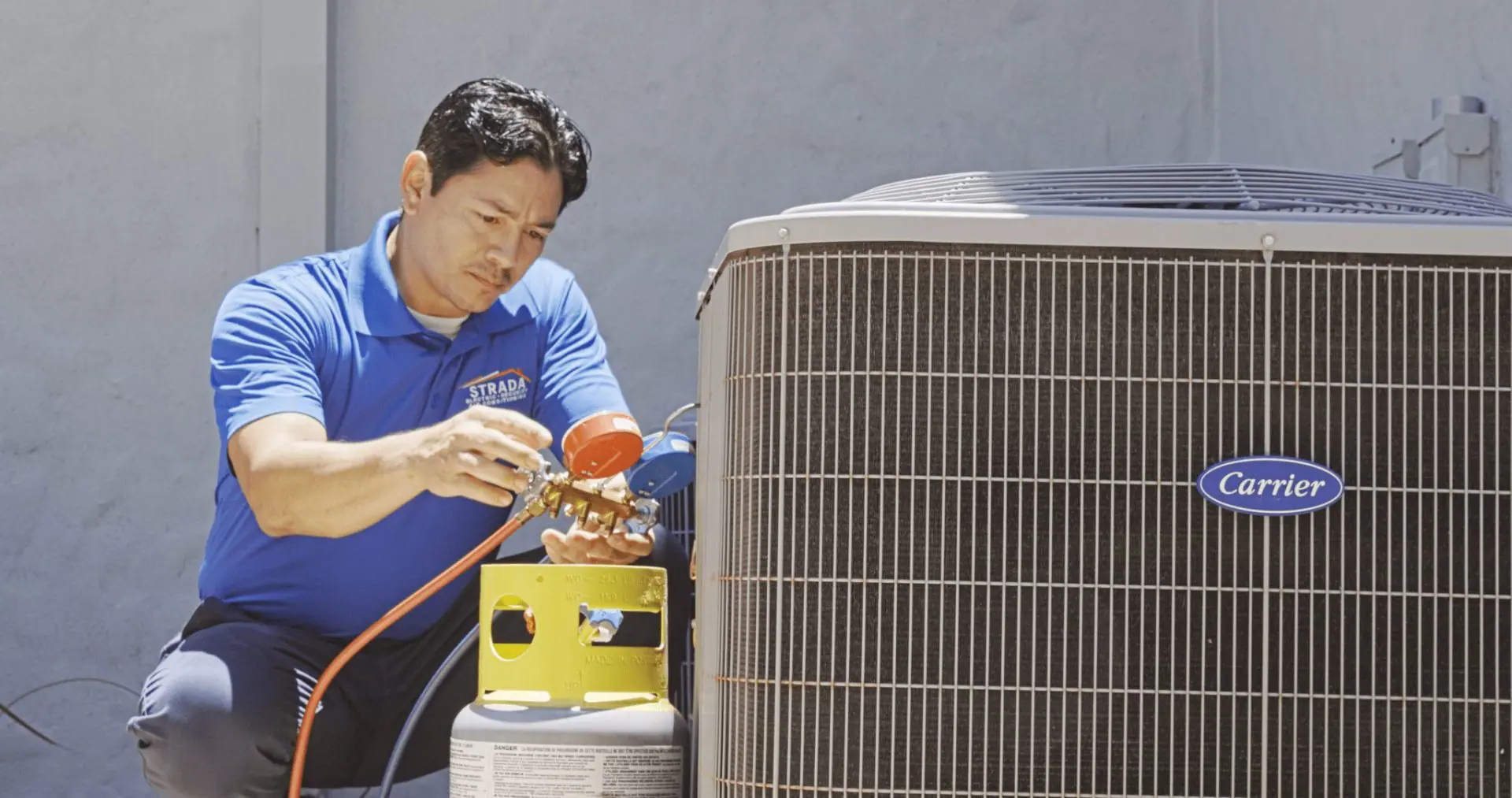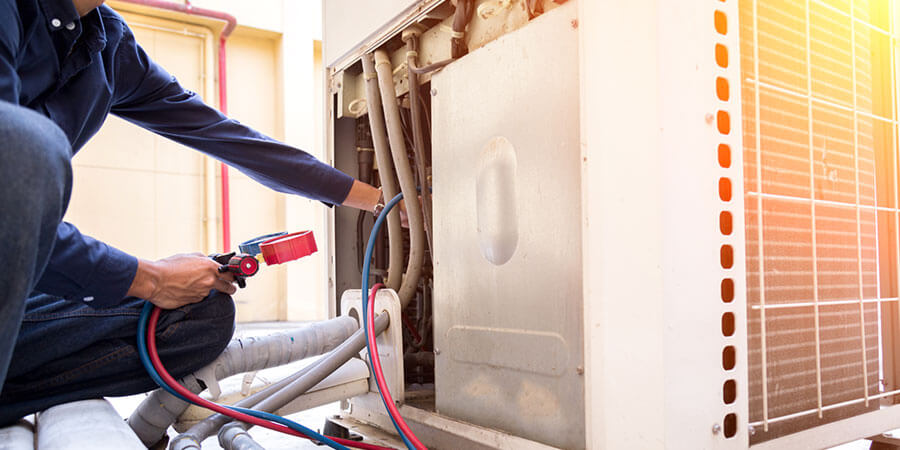Cost Breakdown of Repair vs Full furnace replacement
Selecting Between a Warmth Pump and Furnace: Secret Factors To Consider for Your HVAC Needs
When reviewing home heating alternatives for a/c requires, the decision between a heat pump and a heater can be intricate. Each system uses unique benefits tailored to specific climates and power performance objectives. Recognizing these distinctions is vital for making an educated selection. Secret aspects such as setup costs and ecological impact better make complex the option procedure. Which choice truly lines up with one's comfort and sustainability choices? The following areas will discover these factors to consider thoroughly.
Understanding Warm Pumps: How They Work and Their Benefits
While several property owners consider various home heating options, comprehending how heatpump function and their benefits can greatly influence their choice. Warm pumps run by transferring warmth rather than producing it. In the wintertime, they extract warmth from the outdoors air or ground and transfer it inside, while in the summer, they reverse this procedure, cooling the home by getting rid of warmth outside. This dual capability makes them functional for year-round environment control.One of the primary advantages of heat pumps is their energy performance. They use considerably much less power compared to conventional home heating systems, potentially leading to reduced energy expenses (heat pump installation ooltewah tn). In addition, warmth pumps have a smaller carbon footprint, making them an eco-friendly option. They additionally require less maintenance than traditional systems, adding to lasting expense financial savings. On the whole, recognizing the auto mechanics and benefits of heatpump can assist homeowners make educated choices concerning their home heating and cooling down demands
Discovering Heaters: Kinds, Operation, and Benefits
Heating systems come in different kinds, consisting of gas, electric, and oil models, each with unique operational mechanisms. Understanding these distinctions is necessary, as they affect effectiveness and heating efficiency. Additionally, heaters use many benefits, such as constant heat result and integrity in chillier climates.
Kinds of Heating systems
Heater can vary substantially in design and procedure, with heaters being a prominent selection among property owners. There are several sorts of heating systems, each utilizing various fuel resources and modern technologies. Gas heating systems prevail, leveraging gas to generate warm effectively. Electric furnaces, on the various other hand, make use of electrical resistance to create warmth, often preferred for their uncomplicated installation. Oil heaters, while much less usual, work in locations with restricted gas accessibility (heat pump service). Additionally, condensing heating systems optimize energy effectiveness by reusing and catching exhaust gases. Each type operates via a system of warmth exchangers and ductwork to disperse cozy air throughout a home. Comprehending the distinctions in between these furnace types is vital for informed HVAC choices
Advantages of Furnaces
For house owners looking for trustworthy warmth during chilly months, the advantages of heating systems are significant. Heating systems supply consistent heating, making sure even temperature levels throughout the home. They are particularly efficient in extreme cool, usually exceeding warmth pumps in icy conditions. Different kinds, consisting of gas, electrical, and oil furnaces, provide versatility to meet varied demands and preferences.Furnaces also tend to have reduced first installment costs contrasted to warmth pumps, making them a much more available choice for lots of. Their durable style adds to a much longer life expectancy, with several devices lasting over 15 years with correct upkeep. In addition, modern furnaces are usually outfitted with sophisticated modern technology for improved efficiency, which can lead to lowered energy expenses. Overall, furnaces continue to be a reputable option for effective home heating.

Power Efficiency: Contrasting Warm Pumps and Furnaces
When comparing power performance in between heatpump and heaters, the Seasonal Energy Effectiveness Ratio (SEER) plays a vital role in determining efficiency. Additionally, an operational price analysis reveals the lasting financial ramifications of each system. Recognizing these factors can direct home owners in making informed decisions concerning their heating options.
Seasonal Power Effectiveness Proportion
Power performance plays a vital function in the decision-making process between heatpump and heating systems, specifically when considering the Seasonal Power Performance Proportion (SEER) This statistics measures the cooling performance of heatpump over a whole air conditioning season, offering a standard means to evaluate performance. Greater SEER rankings suggest better power effectiveness, translating to lower energy consumption and reduced energy costs. On the other hand, heating systems are normally assessed making use of the Yearly Gas Usage Effectiveness (AFUE) score, which mirrors home heating effectiveness. When comparing these 2 systems, property owners ought to prioritize SEER scores for heatpump, as they directly influence general energy savings and ecological sustainability. A thorough understanding of SEER can notably influence the long-lasting complete satisfaction and cost-effectiveness of the selected a/c option.
Operational Expense Analysis
Recognizing the functional prices connected with heat pumps and furnaces is crucial for property owners assessing their alternatives. Warm pumps generally offer greater energy effectiveness, converting electrical energy into heat with very little waste. This results in lower month-to-month utility costs, especially in moderate environments. Alternatively, conventional heating systems, particularly gas versions, may have reduced ahead of time costs but can sustain higher operational expenditures gradually due to sustain costs and performance ratings.Moreover, heatpump can operate as both heating and cooling down systems, possibly lowering the requirement for separate cooling and heating devices. While preliminary investments for heatpump might be higher, their long-lasting financial savings in power efficiency can make them a much more cost-effective selection for numerous families. Careful analysis of regional energy prices is important to establish the very best choice.
Installment Prices: What to Anticipate for each and every Heating Unit
Installation prices for home heating systems can vary significantly in between heatpump and heaters, affecting home owners' decisions. Heatpump normally have greater ahead of time installment prices, usually varying from $3,500 to $8,000, relying on the unit size and complexity of setup. This includes the outside unit, interior handling system, and essential ductwork adjustments. Alternatively, furnaces have a tendency to have lower initial expenses, averaging between $2,500 and $6,000, which can be appealing for budget-conscious property owners. Setup costs can boost if substantial ductwork is required.Moreover, the option of fuel kind for heaters-- all-natural gas, lp, or electric-- can additionally influence setup costs. While heatpump supply energy efficiency, their initial financial investment might discourage some customers. Eventually, examining installation prices together with long-term financial savings and effectiveness will certainly help house owners in making informed choices concerning their heater.
Climate Considerations: Which System Performs Better in Your Location
How do climate problems affect the performance of heating unit? The efficiency of heatpump and heaters can differ greatly depending upon the local environment. In moderate environments, heatpump succeed by efficiently moving warmth from the outdoors air, making them an energy-saving alternative. Their performance decreases in exceptionally cold temperatures, where they might struggle to draw out enough heat. Alternatively, furnaces, particularly gas versions, provide regular and trustworthy heat no matter of exterior conditions, making them more effective in cooler regions.In areas that experience milder winters, heatpump can run successfully year-round, providing both heating and cooling. In contrast, areas with rough winters commonly gain from the robustness of heaters. Inevitably, comprehending the neighborhood environment is vital when making a decision in between a warm pump and a heater, as it straight affects their functional effectiveness and total performance.
Upkeep Requirements: Long-Term Take Care Of Heat Pumps vs. Furnaces
While both heat pumps and heating systems need visit here normal upkeep to assure peak performance, their details demands and care routines vary significantly. Heaters typically need less constant attention, with yearly assessments sufficing to check for gas leaks, clean filters, and evaluate overall capability. Their simpler layout commonly permits straightforward repairs.In comparison, heatpump demand biannual maintenance because of their dual duty in cooling and heating. This consists of cleaning coils, checking refrigerant degrees, and ensuring that both the outside Read More Here and interior units operate at their best. In addition, warmth pump upkeep typically entails more complex elements, making specialist maintenance essential.Neglecting maintenance can lead to reduced performance and boosted power prices for both systems. Ultimately, property owners should take into consideration these lasting care demands when picking between a heatpump and a heating system, as proactive maintenance can prolong the life-span and efficiency of either system significantly.
Ecological Influence: Picking a Sustainable Heating Choice
The ecological effect of heating unit is an important evaluation for property owners seeking lasting options. Heatpump are typically a lot more energy-efficient than typical heating systems, as they move warmth instead than create it, significantly minimizing carbon exhausts. By using sustainable power resources, such as air-source or geothermal heatpump, property owners can additionally reduce their environmental footprint.On the other hand, all-natural gas heating systems send out greenhouse gases and add to air pollution, though they typically supply higher warm outcome. Nonetheless, advancements in technology have actually brought about the advancement of high-efficiency heating systems that reduce emissions.Ultimately, selecting a heating unit involves weighing performance versus environmental impact. House owners are motivated to review local energy sources and rewards for eco-friendly systems, ensuring a selection that aligns with both individual convenience and environmental duty. The choice affects not just instant convenience however also lasting sustainability and environmental wellness.
Often Asked Inquiries
For How Long Do Warmth Pumps and Furnaces Typically Last?
The life-span of heatpump normally varies from 15 to twenty years, while furnaces can last between 15 to 30 years. Regular upkeep significantly affects their durability and performance in providing home heating services.
Can I Utilize a Heatpump in Very Cold Climates?
Heatpump can operate in very cool climates, yet their efficiency decreases as temperatures decline. In such problems, additional heating sources might be necessary to preserve comfortable interior temperature levels and assure peak performance.

What Is the Sound Level of Warm Pumps Versus Furnaces?
The noise degrees of warmth pumps and furnaces vary substantially. Generally, warmth pumps run more quietly than traditional heaters, making them better for those delicate to appear, while furnaces may create louder operational sounds during home heating cycles.
Are Warmth Pumps Suitable for Both Cooling And Heating?
Heatpump are certainly suitable for both heating & cooling (heat pump installation ooltewah tn). They operate by transferring warmth, offering efficient temperature level control year-round, making them a versatile selection for homeowners looking for an all-in-one a/c solution
What Size Heater Do I Required for My Home?
Determining the proper size heating unit for a home requires examining elements such as square video, insulation high quality, neighborhood climate, and the home's design. Consulting a specialist can ensure an exact assessment and optimal convenience. Heat pumps normally offer higher power efficiency, converting electrical energy into warm with marginal waste. In moderate environments, warmth pumps excel by effectively transferring warm from the outdoors air, making them an energy-saving alternative. Alternatively, heaters, specifically gas models, offer reputable and regular warmth regardless of exterior problems, making them more effective in cooler regions.In areas that experience milder wintertimes, warm pumps can run efficiently year-round, supplying both home heating and air conditioning. Heat pumps are generally a lot more energy-efficient than standard heaters, as they transfer warm rather than generate it, significantly reducing carbon discharges. By utilizing renewable energy sources, such as air-source or geothermal warm pumps, house owners can further reduce their ecological footprint.On the other hand, all-natural gas heaters give off greenhouse gases and contribute to air pollution, though browse around this web-site they frequently provide higher warmth outcome.